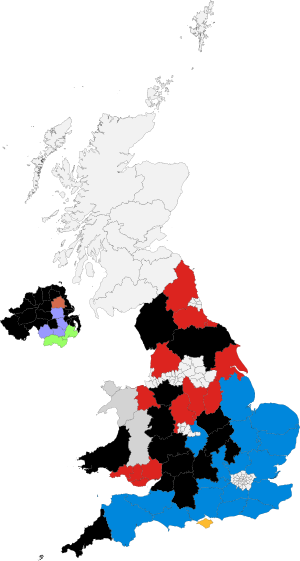| |||||||||||||||||||||||||||||
All 39 non-metropolitan counties, 1 sui generis authority, all 26 Northern Irish districts and all 8 Welsh counties | |||||||||||||||||||||||||||||
|---|---|---|---|---|---|---|---|---|---|---|---|---|---|---|---|---|---|---|---|---|---|---|---|---|---|---|---|---|---|
| |||||||||||||||||||||||||||||
 Colours denote the winning party, as shown in the main table of results. | |||||||||||||||||||||||||||||
The 1989 United Kingdom local elections were held on Thursday 4 May 1989 in England and Wales, and Wednesday 17 May 1989 in Northern Ireland. [1] [2] The Labour Party had the highest projected national vote share, but the Conservative Party, in power at Westminster, gained the most seats. On the same day, there was a parliamentary by-election in the Vale of Glamorgan constituency in Wales; Labour won the seat from the Conservatives.
Contents
- Summary of results
- England
- Non-metropolitan county councils
- Sui generis
- Northern Ireland
- Wales
- County councils
- References
The national projected share of the vote was Labour 42%, Conservative 36%, Liberal Democrats 19%. The Conservatives gained 92 seats, Labour gained 35 seats and the Liberal Democrats lost 175 seats. It was Labour's largest share of the vote in any election in a decade, as the party's popularity continued to improve as a result of the ongoing modernisation process under Neil Kinnock, and that the Conservative government's popularity was starting to fall following the announcement of the poll tax.


